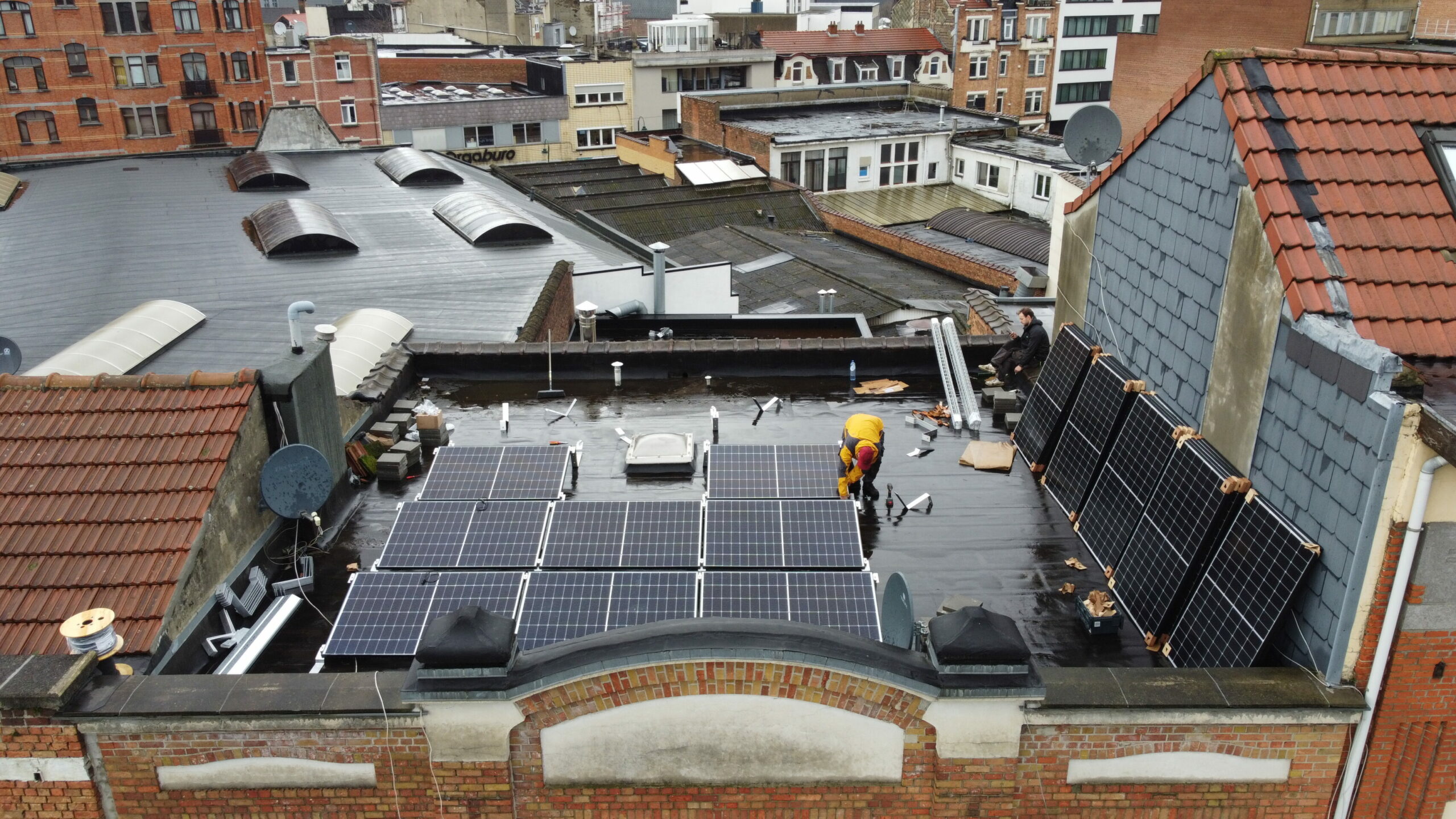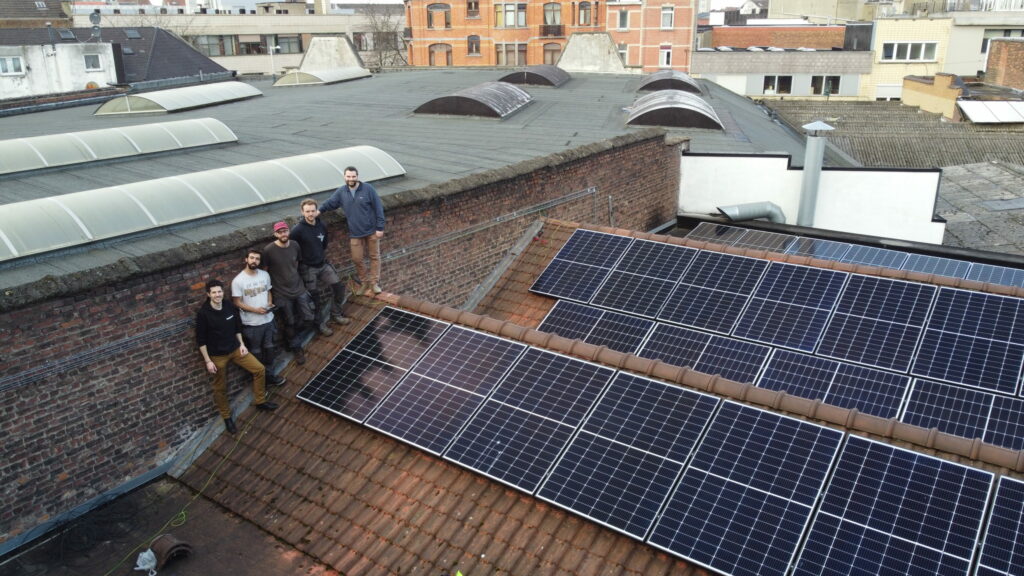Brussels-based renewable energy cooperative Brupower is aiming to raise €800,000 in citizen capital by the end of the year, to fund the rollout of solar panels on city rooftops that can provide cheaper power directly to citizens.
Brupower is an energy cooperative which was founded three years ago to help Brussels citizens participate in renewable energy community projects.
An energy community is a legal entity which can allow citizens to pool together their resources and invest in a renewable energy project. It enables citizens to consume energy produced by others.
Renewable energy communities (RECs) were defined in the EU's 2019 Renewable Energy Directive. The directive requires EU countries to create an enabling legal framework to support RECs.
Earlier this year, Brupower rolled out its first milestone energy community project in collaboration with DoucheFLUX, an association which supports homeless people.
The DoucheFLUX service is based in Anderlecht and provides facilities for homeless people, including showers and washing machines. It is largely powered by the solar panels on its roof, which were installed and are managed by Brupower.

Installation of solar panels on the roof of DoucheFLUX in Anderlecht. Credit: Brupower
Brupower then sells solar power to members of the energy community – in this case DoucheFLUX, as well as two nearby homeowners – at around 20-30% below the market rate.
As Brupower is a social enterprise, it focuses on delivering cheaper energy for its cooperative members, rather than generating profit. This means that Brupower offers stable electricity prices that are lower than other suppliers on the Brussels market. The power is generated in Brussels, so Brupower rates are also not exposed to volatility in the global energy market.
The DoucheFLUX project marks the first time that an energy community has installed solar panels in Brussels. Brupower board member Stanislas D'Herbemont says they are eager to roll out similar projects across the capital.
"We are working hard to ensure that this happens much more," he said, adding that the two things needed to make that happen are roof space and capital investment.
"Today, Brupower has installed a total capacity of around 400 kilowatt-peak. Moving on to next year, what we really need is more roofs. We need to make sure that we can install more solar panels to serve more people," he said.
"We also need cash. We are currently fundraising to continue the cooperative’s activities," he added.
How does it work?
Brupower has almost 40 other solar projects in the pipeline, including a project in collaboration with the municipality of Saint-Gilles where 550 solar panels are currently being installed on five municipal buildings.
The cooperative has garnered more than 300 members and raised more than €550,000 in citizen capital in under two years. It is aiming to reach €800,000 by the end of 2024.
Citizens can join the Brupower cooperative for a minimum investment of €50, and as a shareholder they are co-owners of all Brupower facilities.
Citizens who join the cooperative can then sign an energy sharing contract. This will allow them to buy energy produced by Brupower solar panels.
When the sun is shining, citizens pay the lower rate for Brupower renewable energy. When the solar panels are not producing power, citizens will still be able to get power from their regular supplier. Brupower estimates that joining its cooperative could save the average citizen between €50 and €100 per year.
"It's a two-bill system, meaning you can stay with your supplier and still sign a contract with us. We will cover as much of your consumption as we can, and the supplier will take the rest. Your supplier cannot prevent you from signing this contract, nor can we actually prevent you from signing with any other supplier. All of this is very clear in the law, and you can switch or stop anything in 24 hours —both with your supplier and with us as well," said D'Herbemont.
Related News
- Electricity prices in Belgium shoot up due to gloomy November weather
- Intense solar storm set to hit the Earth on Thursday
- Affordable green electricity for homeless people in Brussels
Until now, Brussels citizens could only benefit from power generated by energy communities in their local neighbourhood. However, Brupower has confirmed that it is launching regional sharing from 1 January 2025. This means that if you join the cooperative from anywhere in Brussels, you can use power generated by Brupower panels.
"Regional energy sharing is going to open to all people in Brussels on 1 January, and we are incredibly excited by that," said D'Herbemont.
"It has been quite a journey to make sure that we have the capacity from an organisational standpoint to deliver, but we are now ready. We are hoping to serve between 250 and 300 people in Brussels with clean local kilowatt hours," he added.
More support for energy communities
Although renewable energy communities are now legally permitted under the 2019 EU directive, some note that there are still difficulties transposing that into national law.
Josh Roberts is a senior policy advisor with REScoop.EU, the European federation of energy communities. He said that there is still a lack of support at national level to help establish energy communities.
"[Most Member States] don't have the basic, systematic support that is necessary and legally required under the enabling framework in the renewables directive," he said.
He added that these kinds of citizen projects need supportive policies, to help them compete with more corporate energy providers.
"They are trying to provide socio-economic value, and they are trying to bring people into the energy transition, and you need to support this through policy. These businesses are coming with a completely different value proposition, and you cannot regulate them the same way as you regulate somebody who is just in the market to make a profit," he said.

